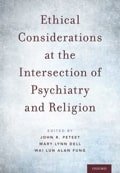Ethical Considerations at the Intersection of Psychiatry and Religion

By John Peteet, Mary Lynn Dell, and Wai Lun Alan Fung (Editors)
View profile for:
Dr. W.L. Alan Fung
Psychiatry and religion/spirituality (R/S) share an interest in human flourishing, a concern with beliefs and values, and an appreciation for community. Yet historical tensions between science and religion continue to impede dialogue, leaving clinicians uncertain about how to approach ethical questions arising between them. When are religious practices such as scrupulosity disordered? What distinguishes healthy from unhealthy religion? How should a therapist approach a patient's existential, moral or spiritual distress? What should clinicians do with patients' R/S convictions about faith healing, same-sex relationships, or obligations to others?
Discussions of psychiatric ethics have traditionally emphasized widely accepted principles, generally admired virtues, and cultural competence. Relatively little attention has been devoted to the ways that R/S inform the values of patients and their clinicians, shape preferred virtues, and interact with culture.
Ethical Considerations at the Intersection of Psychiatry and Religion aims to give mental health professionals a conceptual framework for understanding the role of R/S in ethical decision-making and serve as practical guidance for approaching challenging cases. Part I addresses general considerations, including the basis of therapeutic values in a pluralistic context, the nature of theological and psychiatric ethics, spiritual issues arising in diagnosis and treatment, unhealthy and harmful uses of religion, and practical implications of personal spirituality. Part II examines how these considerations apply in specific contexts: inpatient and outpatient, consultation-liaison, child and adolescent, geriatric, disability, forensic, community, international, addiction and disaster and emergency psychiatry, as well as in the work of religious professionals, ethics committees, psychiatric education, and research.
Thick descriptions of case examples analyzed using the framework of Jonson and Winslow show the clinical relevance of understanding the contributions of religion and spirituality to patient preferences, quality of life, decision making, and effective treatment.
This is a peer reviewed Book
Publisher: Oxford University Press
Year: 2018
ISBN/ISSN: 9780190681968